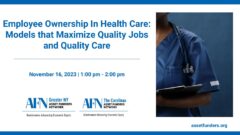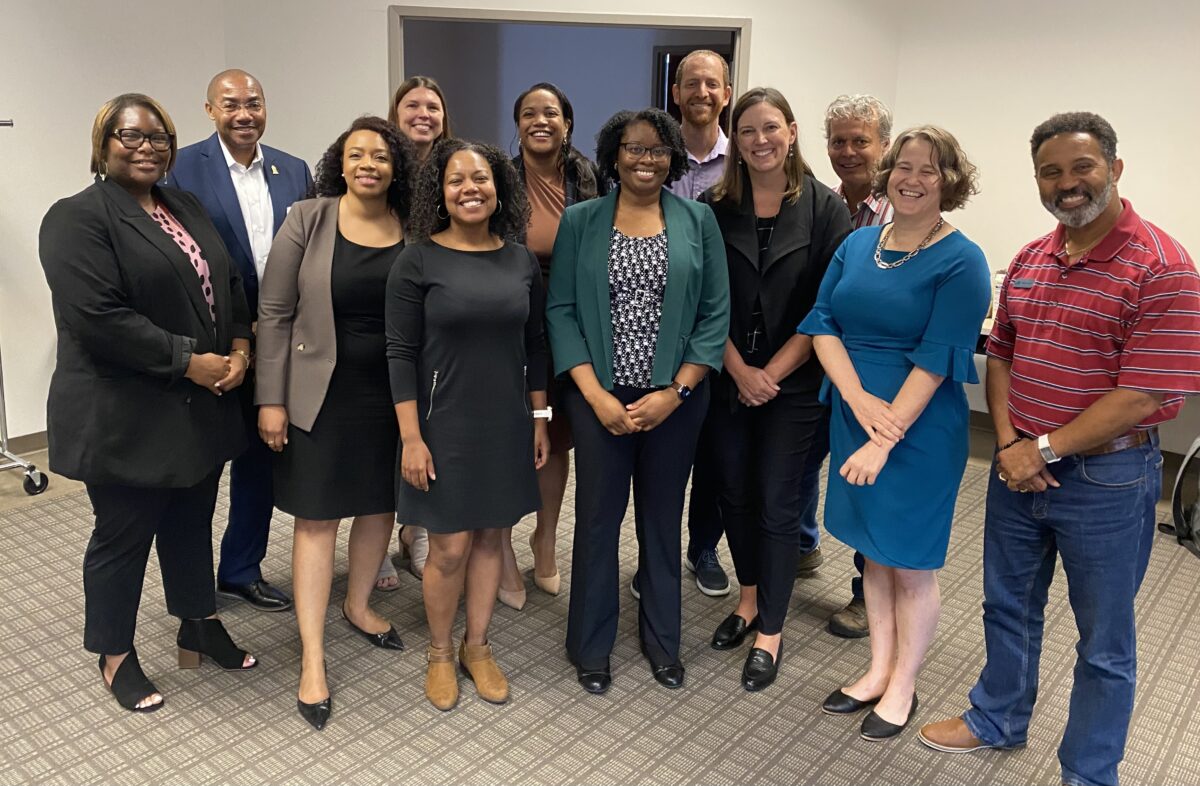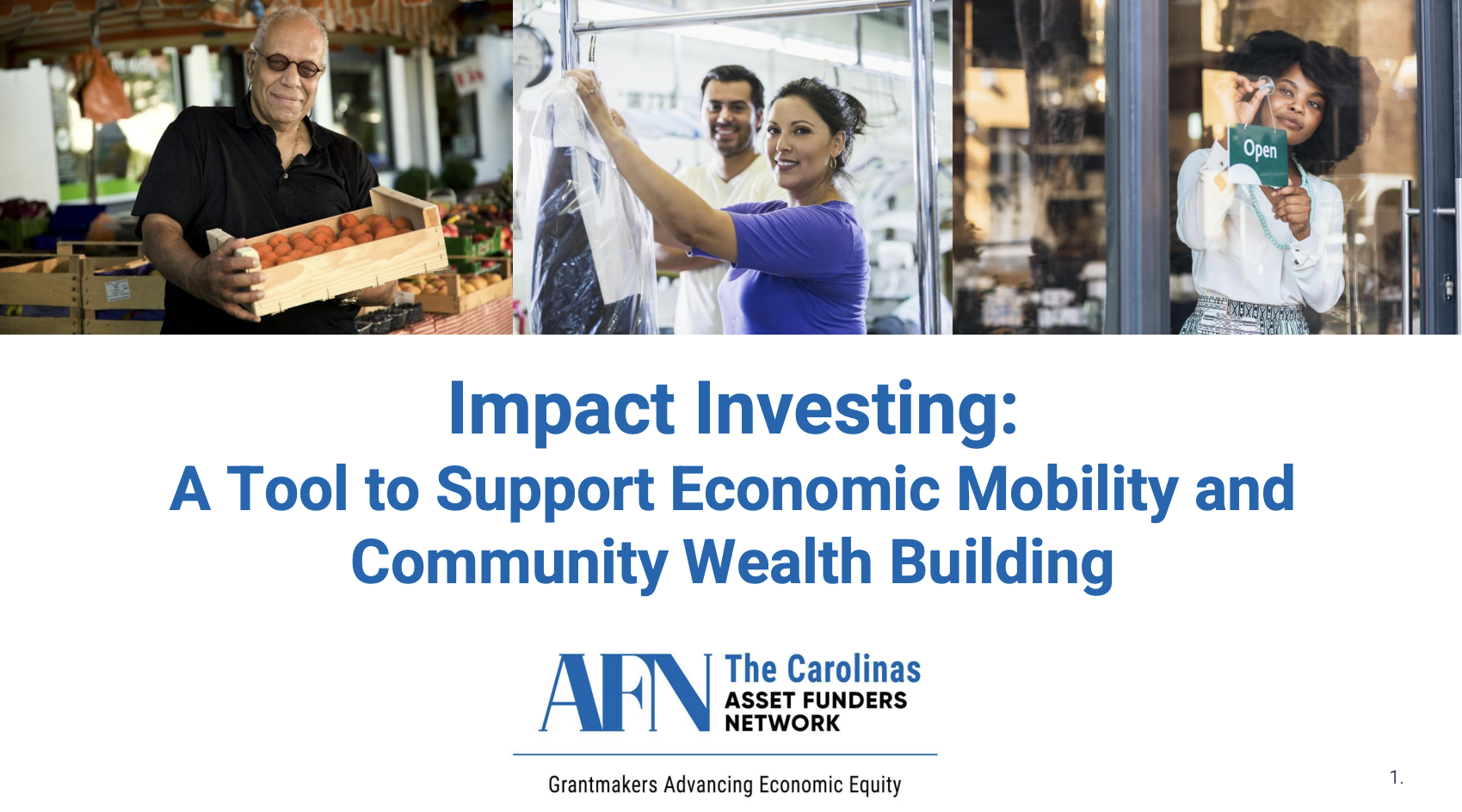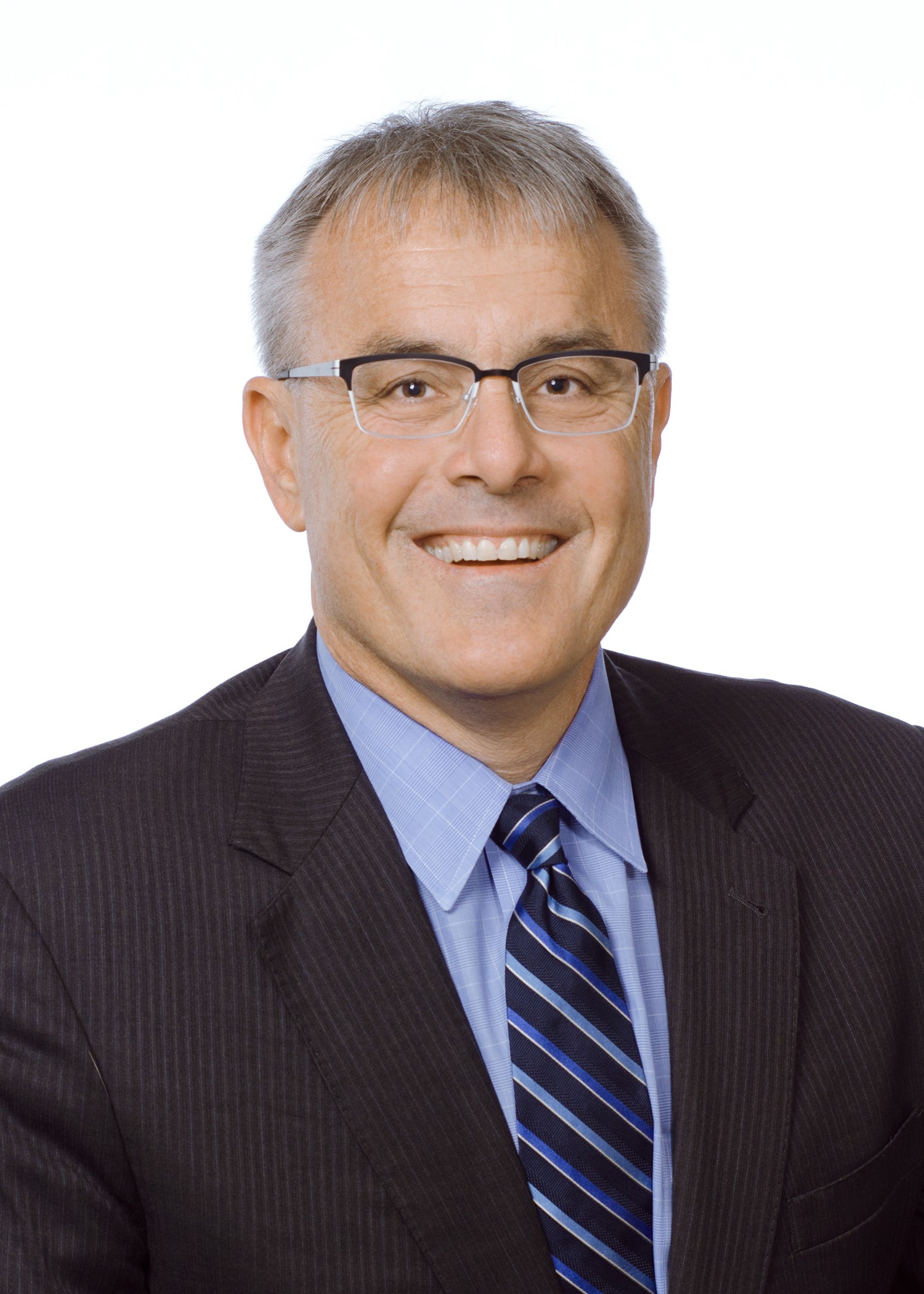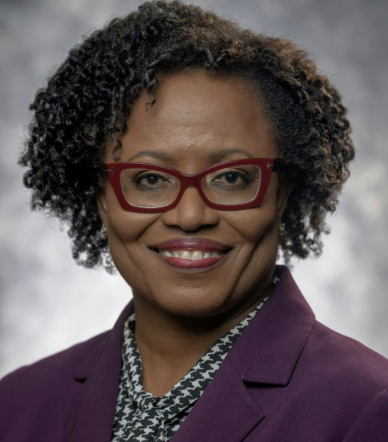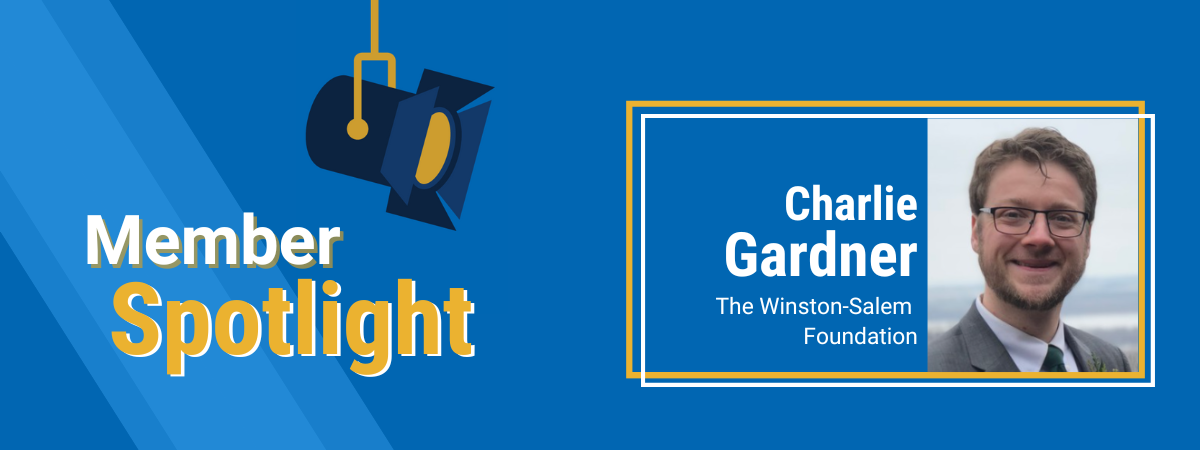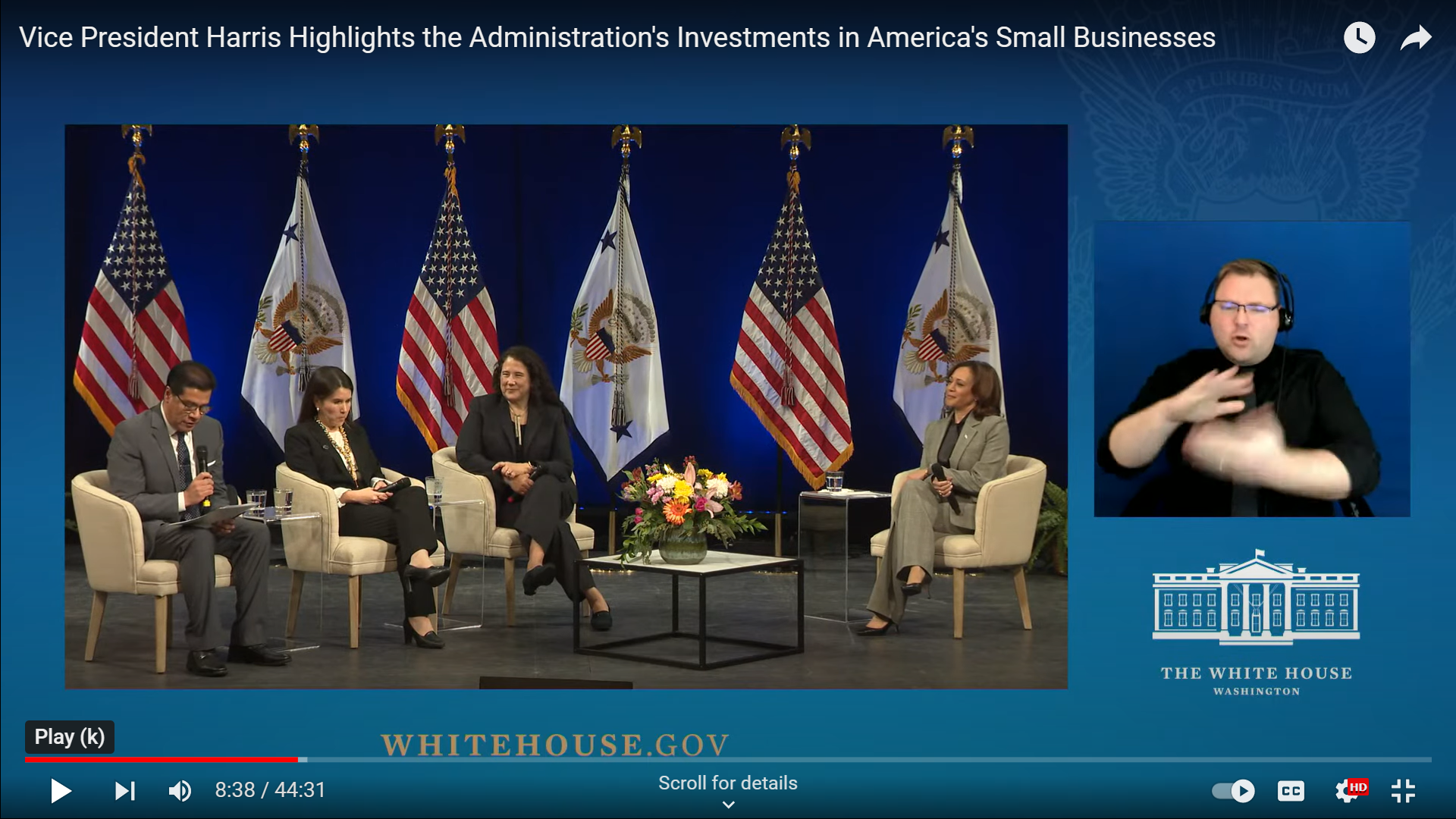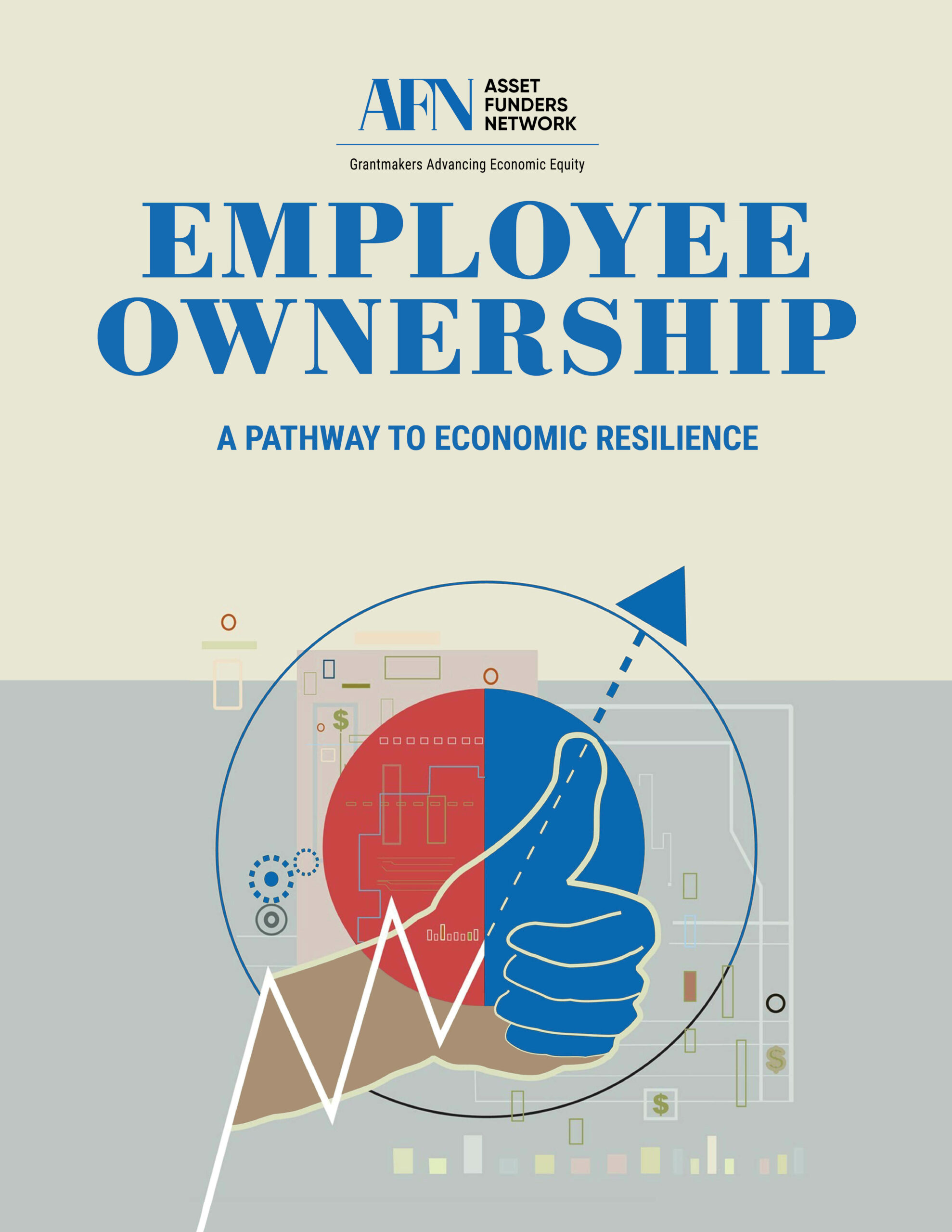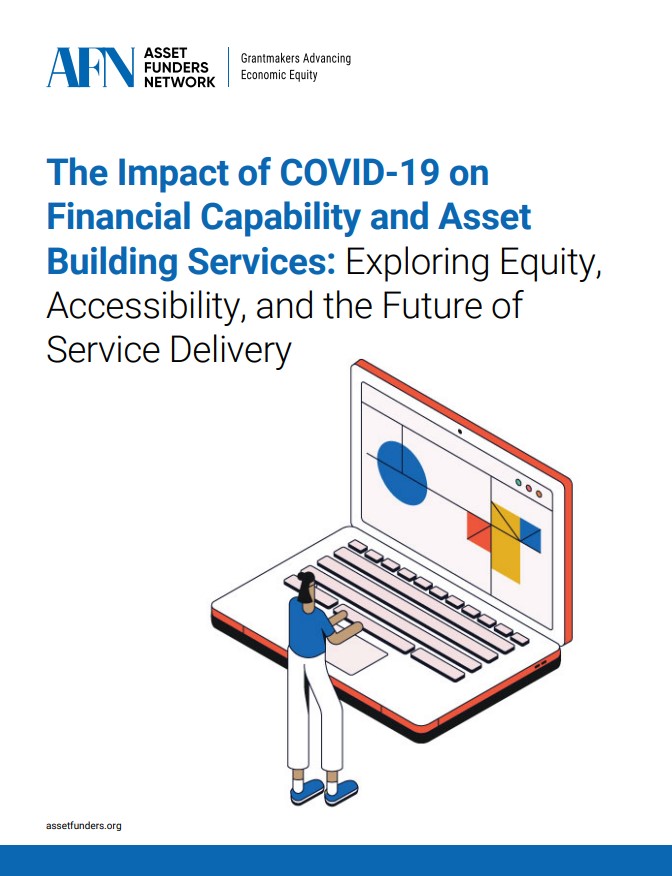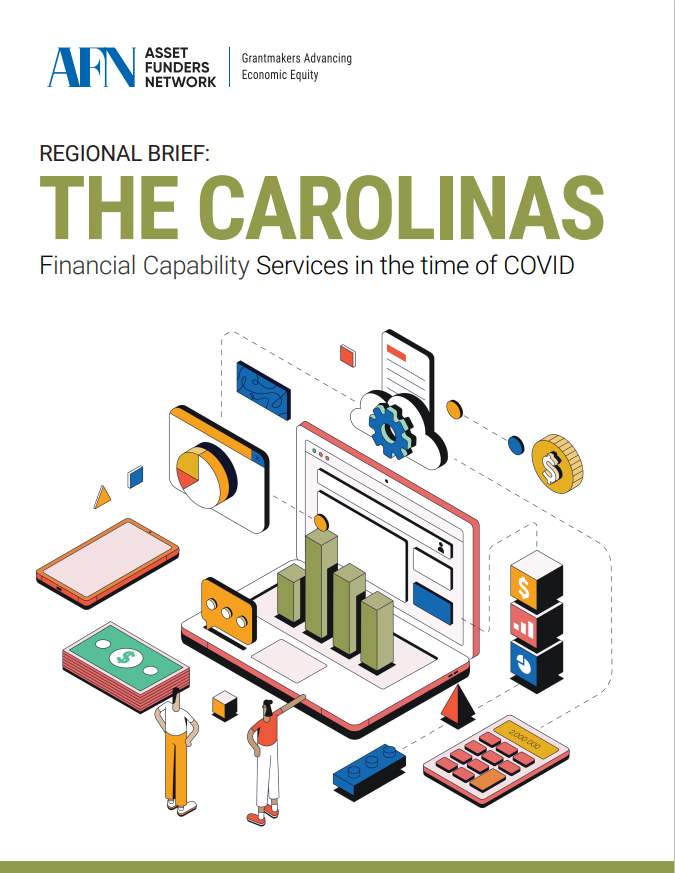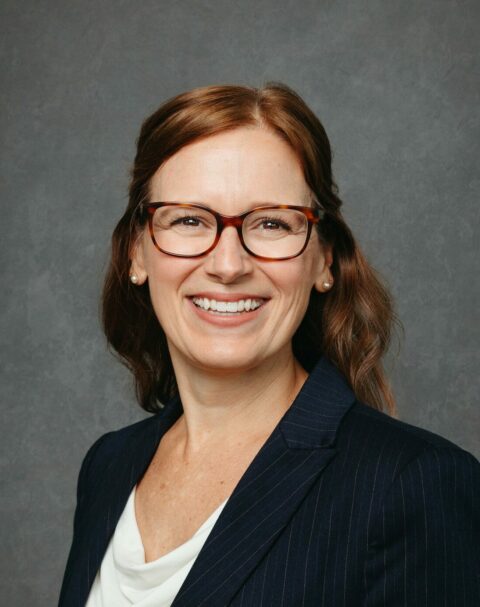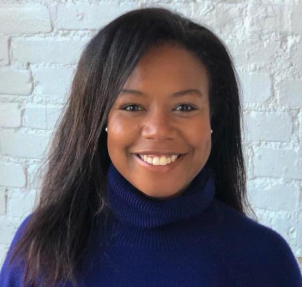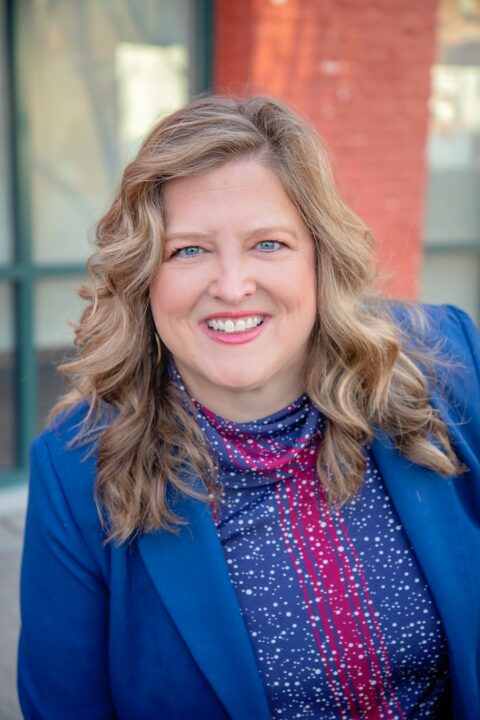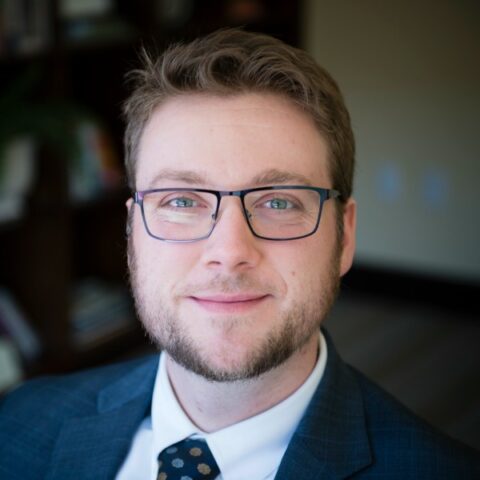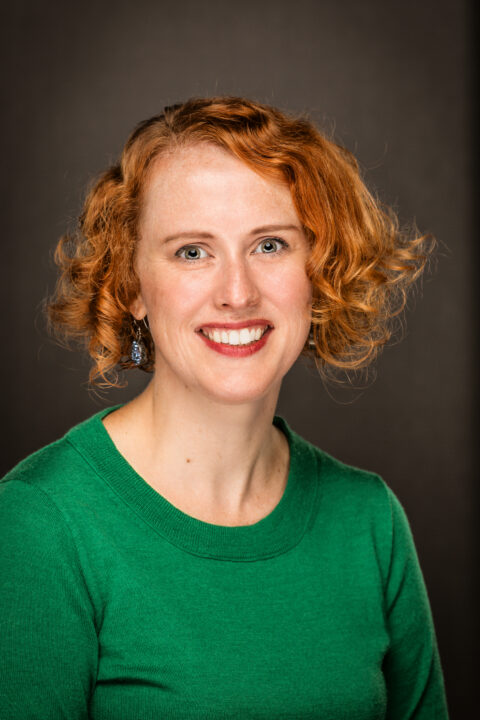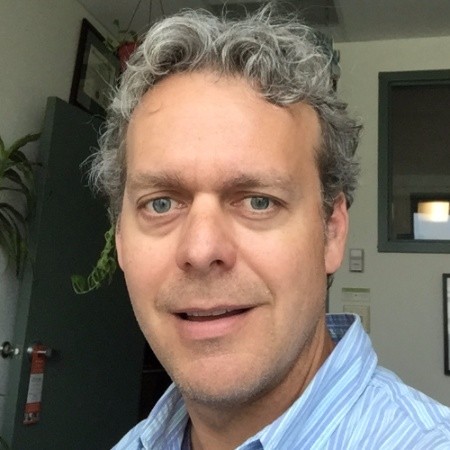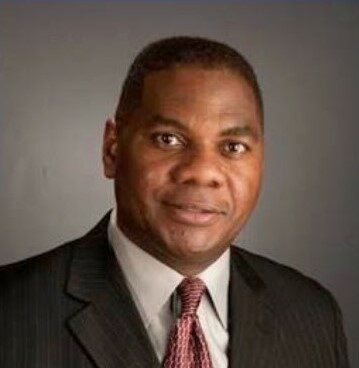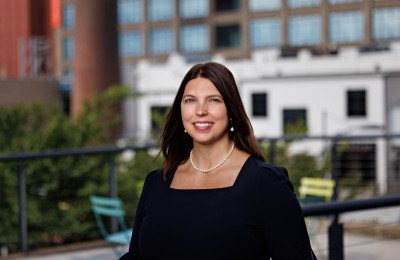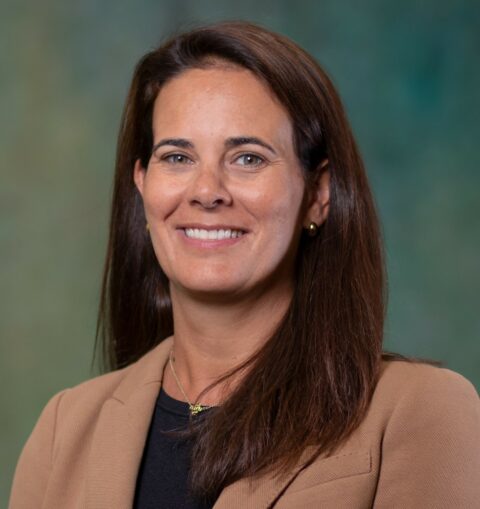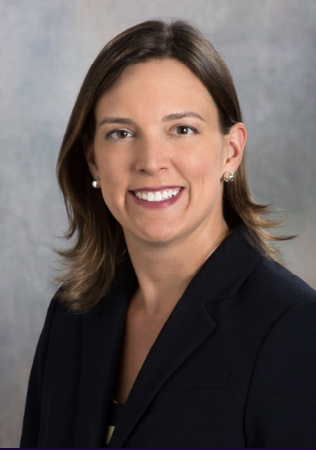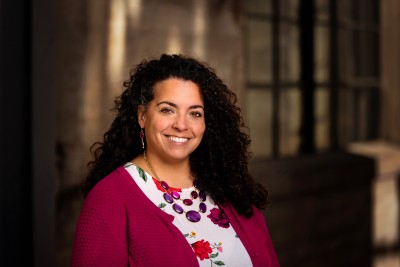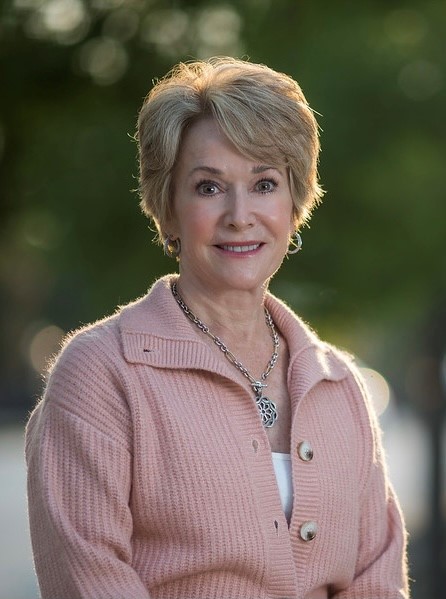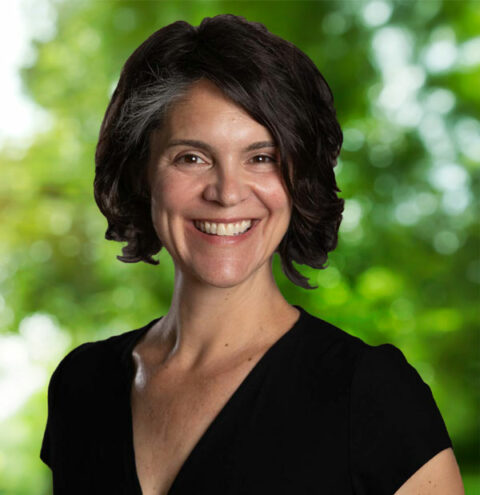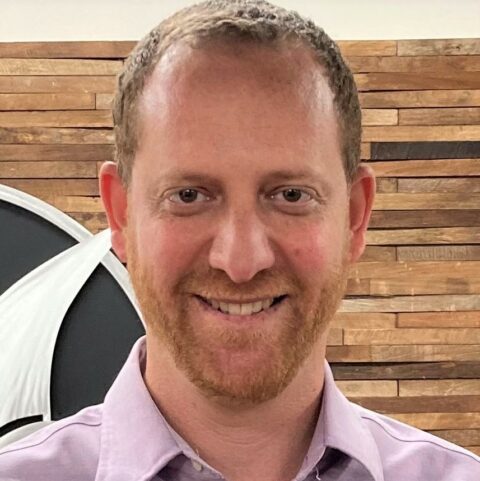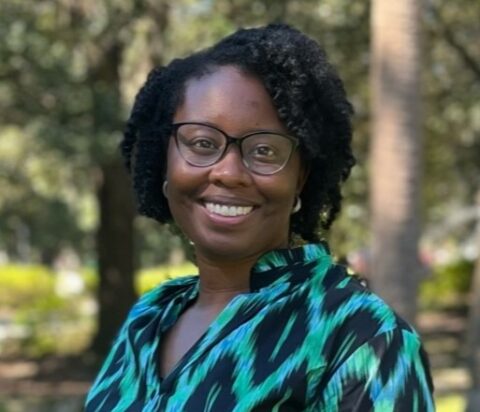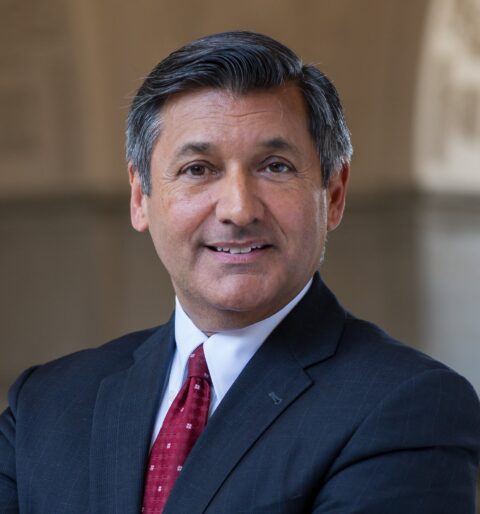The Carolinas AFN is a regional chapter of grantmakers who advance equitable wealth building and economic mobility. Our chapter provides a collaborative infrastructure for grantmakers and financial institutions of all types and sizes to learn, share, and invest in asset-building strategies that support the financial wellbeing of people in the Carolinas. We incorporate a systems-level change approach to our individual and collective philanthropic investments.
We work at the intersection of various asset building strategies including—health, employment, business ownership, housing, education, financial health, racial equity, wealth building, and economic justice. The Carolinas AFN members meet regularly and host events to share ideas. Grantmakers investing in North Carolina or South Carolina should contact Velvet Bryant if interested in joining this chapter.
Regional Focus Areas
- Financial Health and Inclusion
- Health-Wealth Connections
- Housing Stability and Homeownership
- Racial Equity
- Small Business Ownership
Upcoming Events
Check back soon for information on upcoming events.
CLICK HERE for more information and resources from our past events.
Chapter Highlights
Exploring Collaborative Strategies to Advance Economic Mobility in South Carolina
On May 20, 2024, Carolinas AFN invited funders and financial institutions located and/or investing in South Carolina to participate in an interactive session to build a shared vision for a collaborative funder table focused on expanding pathways to economic mobility. Attendees discussed regional synergy opportunities to promote the financial wellbeing of families and communities, identified ongoing and emerging cross sector innovations, and supported action-oriented strategies that advance economic mobility and equitable wealth building.
Exploring Financial Resilience: Insights from the 2024 Emerging Issues Forum
On February 13, 2024, members of the Carolinas AFN regional chapter participated in the 2024 Household Financial Resilience convening hosted by the Institute for Emerging Issues. Click here to learn more.
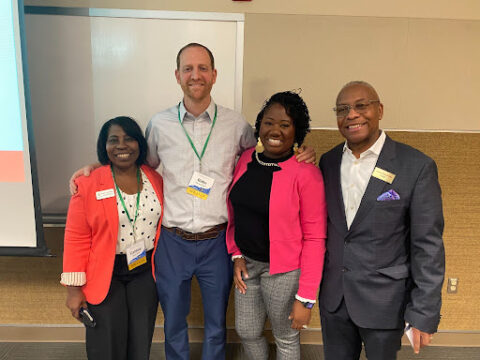
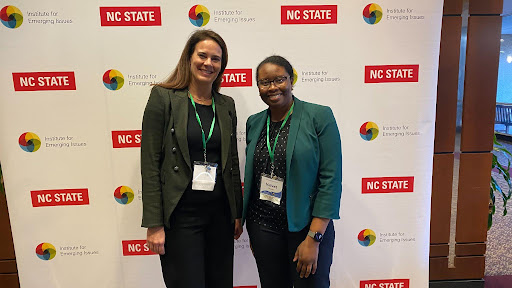

Employee Ownership In Health Care: Models that Maximize Quality Jobs and Quality Care
On November 16, 2023, the Carolinas Asset Funders Network and the Greater New York Asset Funders Network joined Adria Scharf, Associate Director, Rutgers Institute for the Study of Employee Ownership and Profit Sharing for this cross-regional virtual convening to explore case studies in employee-owned health care businesses and the impact for the Carolinas and Greater New York regions.
The program included:
- Briefing on case studies of how employee-owned health care businesses can offer better jobs and better care; and
- Targeted discussion about how to support and grow employee ownership in health care and health services and highlight the role for philanthropy.
A Look at The Wealth Gap in the Carolinas and Opportunities for Collaboration
The Carolinas Asset Funders Network hosted the United States Consumer Financial Protection Bureau and the Federal Reserve Bank of Richmond, Charlotte Branch to showcase new information on consumer experiences in the Carolinas, with particular focus on rural communities and communities of color. This meeting elevated new data to inform how we all invest in and advocate for closing the wealth gap. LEARN MORE
Read the Banking and Credit Access in the Southern Region of the U.S. Report.
Impact Investing: A Tool to Support Economic Mobility and Community Wealth Building
On May 16, 2023, the Carolinas Asset Funders Network, in partnership with Mission Investors Exchange, continued to activate AFN’s interactive funder primer, On the Road to Racial and Economic Justice: Essential Questions to Address Racial Bias in Asset Building Philanthropy.
Legacy in Action: AFN’s Role in Advancing the Health-Wealth Connection
A blog from Mark Constantine, Senior Vice President of Community Investment at Dogwood Health Trust
AFN has been a constant across my roles, helping to shape frameworks around asset building. Early on, it was at the forefront of tracking demonstrations of children’s savings accounts and individual development accounts (IDAs), playing a pivotal role in guiding funders like me to better understand and deploy these tools for advancing asset development.
Community Banks and the Future of Equitable Wealth Building
A blog from Lynette Bell, President of Truist Foundation
As president of Truist Foundation and co-chair of the Asset Funders Network (AFN) 2024 conference, I find myself reflecting deeply on AFN’s 20th anniversary and its implications for the future of asset-building grantmakers. Our collective mission to address economic inequities and foster generational wealth-building has never been more critical.
Research shows that low wealth affects our mental health, increasing the likelihood of distress and depression (Ettman et al. 2020). Yet, wealth, as evidenced by our persistent racial wealth gaps, is not distributed evenly due to longstanding structural racism and disparities.
AFN’s Member Spotlight on Charlie Gardner
Charlie Gardner of The Winston-Salem Foundation was highlighted in AFN’s monthly feature, the Member Spotlight. Learn more about Charlie!
Latino Community Credit Union Leads Discussion with Vice President Kamala Harris.
During a regional discussion with Vice President Kamala Harris, AFN member, Latino Community Credit Union was recognized for expanding access to capital and financial coaching to support Latino-led businesses and business owners. The discussion highlighted national and local models to help small business ownership and homeownership as pathways to intergenerational wealth building and economic mobility.
Employee Ownership Strategies for Economic Resilience and Equity
Check out Asset Funders Network’s April 2023 brief and webinar, Employee Ownership Strategies for Economic Resilience and Equity: Pathways for Philanthropy. This resource is especially helpful for funders and practitioners involved in small business, employee ownership, job quality, and racial equity strategies. The webinar features regional insights from one of the Carolinas AFN members, Charlie Gardner, program officer at the Winston-Salem Foundation.
Financial Capability Services in the time of COVID
AFN and the University of Wisconsin-Madison Center for Financial Security (CFS) completed a study to better understand the transition to remote services among financial capability and asset building (FCAB) programs. The study included a Carolinas regional focus group and a nationally distributed survey.
Waiving Criminal Court Fees Prevents Harms of Civil Debt- New Report
North Carolinians involved in the criminal justice system are assessed financial obligations that can add up to thousands of dollars—and most are poor and cannot pay them. The practice of converting these fines and fees to civil judgments has become increasingly common in the state, according to a report released by the Center for Responsible Lending, Forward Justice, and the North Carolina Justice Center. But very little of the civil debt is paid off, so many individuals subject to the judgments go deep into debt and experience harsh consequences that may last for decades.
The report, “Waiving Criminal Court Fees Prevents Harms of Civil Debt,” presents data distilled from North Carolina’s Civil Case Processing System (known as VCAP) in a new method of analyzing the costs of these conversions among the states.
Read the report here.
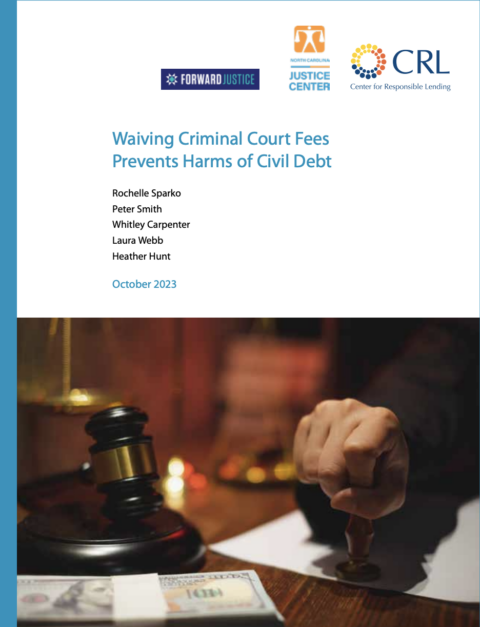
Funding provided by the Annie E. Casey Foundation, the Z. Smith Reynolds Foundation, and the North Carolina Justice Center.
North Carolina lawmakers pass historic legislation to expand Medicaid
North Carolina has become the 40th state to expand Medicaid. It’s estimated that more than 600,000 people in North Carolina will be eligible for coverage once Medicaid expansion is implemented. North Carolina hospitals will also see a sharp decrease in the amount of uncompensated care they provide, and the Governor has noted that expanding Medicaid will create 40,000 jobs in North Carolina.
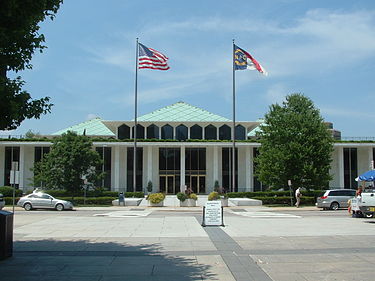
How We Work
- Inform: Highlight promising practices, key issues, and innovations in the field through funder-only dialogues and other community-wide convenings. Members dive into the roots of systems that create wealth disparities and exploring frameworks and transformational solutions.
s
- Connect: Members support peer-to-peer learning and cross-sector collaboration. Members identify and leverage replicable and scalable high-impact strategies and innovative approaches to connect and inform influential funders of actionable investments.
- Influence: Raise the visibility of asset-building strategies within the broader community of foundations, public-sector funders, and financial institutions. Members seek opportunities to accelerate economic prosperity while also reducing racial, ethnic, and gender wealth gaps.
- Build: Work to increase the number of grantmakers and resources focused on strategies that help low and moderate income people build and protect assets. Members leverage one another’s interests and investments and actively look for additional funders willing to co-invest in North Carolina or South Carolina.
EVENTS
Contact
Are you a funder or financial institution in North Carolina or South Carolina interested in joining this chapter? Contact us to learn more.
Velvet Bryant, velvet@assetfunders.org
Steering Committee
Federal Reserve Bank of Richmond
Truist Foundation
Self-Help Credit Union
Reidsville Area Foundation
The Winston-Salem Foundation
Google Fiber
Self-Help Credit Union
The Foundation for a Healthy High Point
Z. Smith Reynolds Foundation
Wells Fargo
Truist Foundation
Coastal Community Foundation
Z. Smith Reynolds Foundation
Cone Health Foundation
JPMorgan Chase & Co.
Dogwood Health Trust
Latino Community Credit Union (LCCU)
